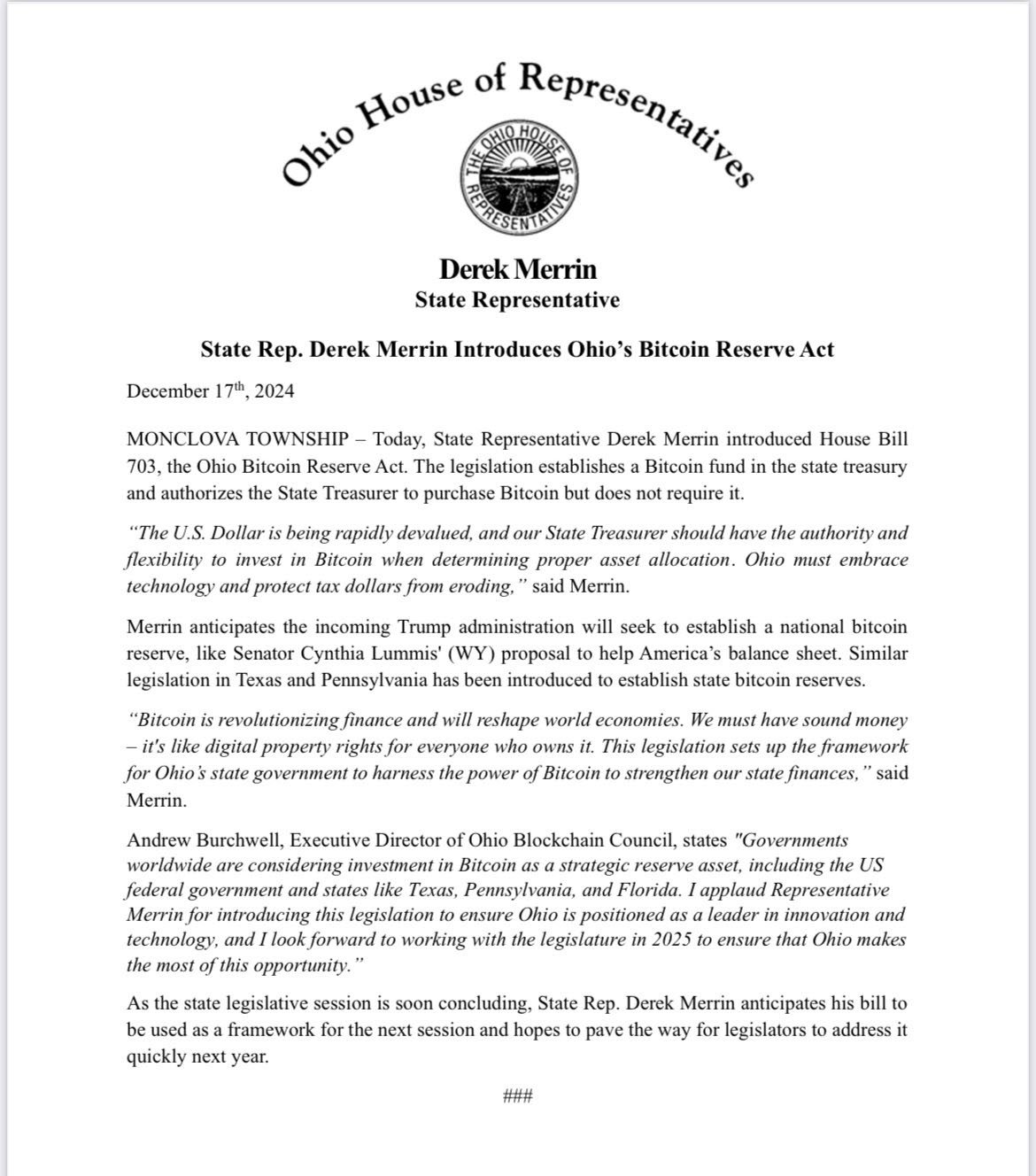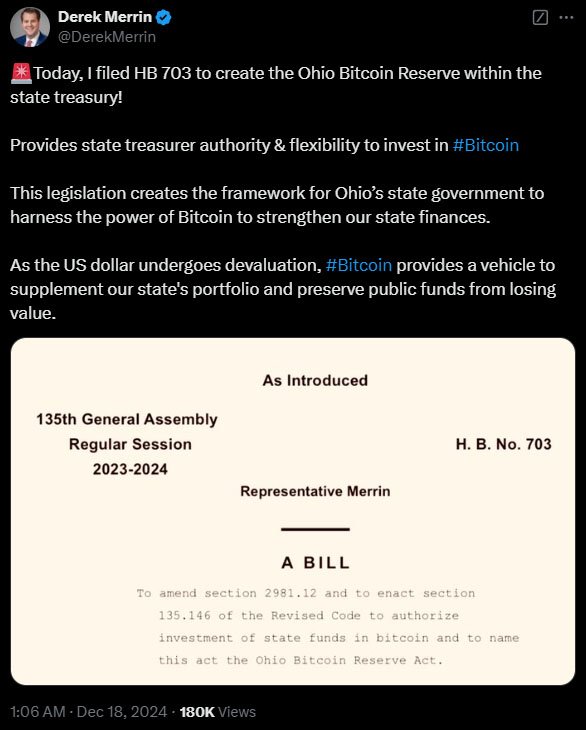Ohio becomes the latest state to join the movement to add bitcoin to its treasury reserves.
Representative Derek Merrin, a Republican leader in the Ohio House, has sponsored House Bill 703, the Ohio Bitcoin Reserve Act, which would allow the state to invest in bitcoin.

The bill looks to create a bitcoin reserve fund within the state treasury. It doesn’t require specific purchases but gives the State Treasurer the ability to buy bitcoin as part of the state’s asset allocation.
According to Merrin, this flexibility is key, as the US dollar is devaluing and more people are looking at bitcoin as a hedge.

Merrin said:
“The U.S. Dollar is being rapidly devalued, and our State Treasurer should have the authority and flexibility to invest in Bitcoin when determining proper asset allocation. Ohio must embrace technology and protect tax dollars from eroding.”
The bill also fits into Merrin’s overall goal of updating financial systems. He has long been a champion of individual and government rights to digital assets, calling Bitcoin “like digital property rights for everyone who owns it.”
Ohio is not the only state to consider bitcoin reserves.
Texas and Pennsylvania have introduced similar bills in recent months. Pennsylvania’s bill allows the state to allocate up to 10% of its reserves in bitcoin, and Texas will create a bitcoin reserve funded by donations and tax payments in bitcoin.
Related: Texas State Rep. Files Bill for Strategic Bitcoin Reserve Act
Related: Pennsylvania Pushes Bill for Bitcoin Reserve
Texas Representative Giovanni Capriglione and Pennsylvania Representative Mike Cabell have both said bitcoin is a hedge against economic uncertainty. “Bitcoin provides stability in uncertain economic times,” said Cabell, echoing Merrin.
Merrin introduced the Ohio Bitcoin Reserve Act on December 18, but the timing is tough.
The bill was filed two weeks before the 135th General Assembly adjourned so there’s not enough time for it to pass this session. Merrin will re-introduce the bill in the next General Assembly which starts in January 2025. He said:
“This legislation sets up the framework for Ohio’s state government to harness the power of Bitcoin and strengthen our state finances. I hope it paves the way for legislators to address it quickly next year.”
Merrin has been endorsed by local and national Bitcoin advocates. Andrew Burchwell, Executive Director of the Ohio Blockchain Council, likes the bill, saying it puts Ohio at the forefront of technology and innovation.
“Governments worldwide are considering investment in Bitcoin as a strategic reserve asset,” Burchwell said, emphasizing Ohio’s opportunity to lead in this space.
The push for bitcoin reserves is happening not just in states like Ohio, Texas and Pennsylvania but also at the federal level. President-elect Donald Trump has thrown out the idea of a national bitcoin reserve and now policymakers are talking.
Republican Senator Cynthia Lummis has even introduced legislation for the U.S. government to buy 1 million bitcoin over 5 years, and now states are looking at state and national bitcoin strategies.
Bitcoin’s value has increased its appeal as an asset. Over the last year it’s gone up 155% and is now above $100,000. Proponents say this proves bitcoin is a long term inflation and economic volatility hedge.
While the idea of a bitcoin reserve is gaining momentum, some officials are approaching it with caution.
Bitcoin’s price volatility might pose a risk if large reserves are held. But proponents say a conservative allocation—like the 10% cap in Pennsylvania—can mitigate the risks while still getting the big returns.
“Bitcoin is revolutionizing finance and will reshape world economies,” Merrin said. “We must have sound money—it’s like digital property rights for everyone who owns it.”
Ohio’s bitcoin reserve is a big step in bringing digital assets into public finance.
If passed, it will put Ohio at the forefront of the Bitcoin space and a model for other states to follow. The bill will be back in 2025, so Bitcoin proponents will be watching Ohio as it goes into this new financial territory.
For now, the conversation around bitcoin reserves is growing and that’s a sign that governments and institutions are starting to see the scarce digital asset’s place in the global economy.










